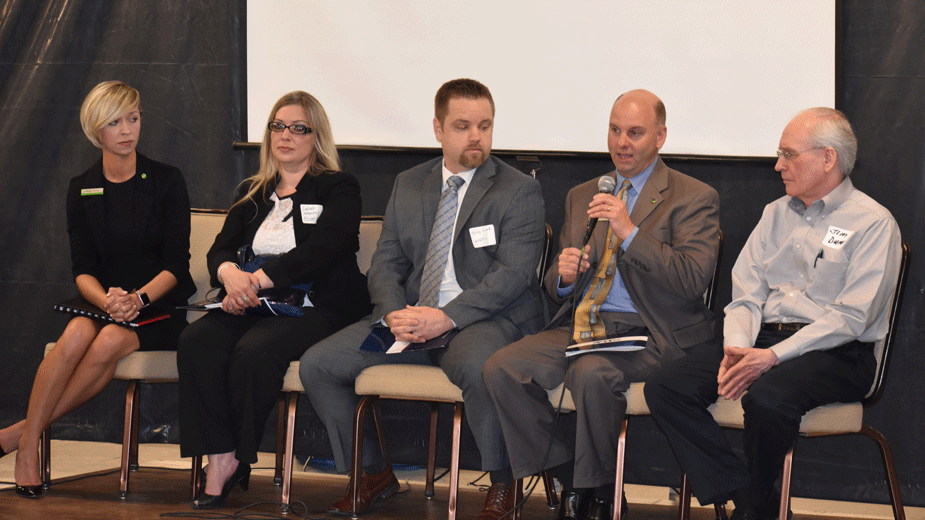Workshop Outlines Help So Small Businesses Grow
WARREN, Ohio – Just a few hours before one of the Mahoning Valley’s largest employers announced plans Friday to lay off up to 1,500 workers, participants in a U.S. Small Business Administration workshop heard about the importance of small businesses and what tools were available to help them thrive.
The SBA and the city of Warren presented the showcase at the Tech Belt Energy Information Center here, which was attended by about 90 people who operate businesses or are interested in starting new ones.
“This is really the start of a program to ensure that businesses that are here in Warren can use our programs to really grow and create jobs,” said Gil Goldberg, district director of SBA’s Cleveland District office. While the number of loans in the 28 northern Ohio counties his office covers is up 16% for the first half of the fiscal year, loans in Warren and Trumbull County are down, he reported.
As part of the opening remarks at the workshop, which took place just hours before General Motors announced it is eliminating the second shift at its Lordstown plant, Third Ward Councilman John Brown emphasized the importance of small business.
“Small business has to bring back this area. We all know the mills and the big, large manufacturers are gone for now. So it’s in your hands to help bring back this area,” Brown said.
The workshop covered business financing, government contracting, exporting, business assistance resources and selling to millennials.
John Renner, SBA supervisory business opportunity specialist, outlined a prime sales opportunity for small businesses: the federal government itself. The government spends about $100 billion on goods and services that it purchases from small businesses.
“It’s not for everybody, but if you have a business that sells a product or service that the government buys – and the government buys just about everything – then you should at least look at the possibility,” Renner said.
In Trumbull County, the federal government has purchased $45 million worth of goods and services over five years, mostly from small businesses, according to Renner. “It’s not a huge number, but it’s not small,” he continued. “I think we have the ability to make that better.”
One advantage of being a vendor for the federal government is the customer always pays on time, something that doesn’t always happen with private-sector customers, he said. Because the information on past contracts is publicly available, businesses can research what the government has paid and determine whether they can be competitive.
“The challenge is [learning] which part of the government is buying what you want to sell,” Renner added. “Try to figure that out first and then dive right into that.”
He pointed out that 23% of purchasing at every federal agency is directed to small businesses, including set-aside goals for economically and socially disadvantaged companies and those operating in Historically Underutilized Business Zones, census tracts with high levels of unemployment or low income.
To do business with federal agencies, businesses have to be registered with the System for Award Management, or www.SAM.gov, Renner said.
Amy Freedman, international trade specialist with the U.S. Commercial Service, presented the panel focusing on opportunities for exporters alongside Ellen Chittester, international trade consultant with the Ohio Small Business Development Center Export Assistance Network at Youngstown State University.
“The bottom line is if you are a company with a good value proposition for your goods or service, there will hopefully be demand for you overseas,” Freedman said. “My goal is to stop you from being reactive and help you become a proactive exporter — so not just answering those calls when customers find you online but also helping you develop channels into markets.”
Ohio is the eighth-largest exporting state, Chittester said, noting the Youngstown-Warren region has the highest percentage of export gross domestic product in the state.
The Ohio Small Business Development Center Export Assistance Network focuses on finding export opportunities for companies, identifying where demand for products is highest. The state leads trade missions – including an upcoming one to Vietnam and Thailand – and offers international market assistance grants, which can reimburse half of a company’s expenses up to $25,000.
In addition, the Ohio export internship program is offered through three state universities, including YSU, Chittester said. The program matches companies with export-trained, full-time summer interns who will focus on export development.
While there is competition among lenders locally, “At the end of the day, we’re all very invested in economic development in our community,” said Sarah Palmer, assistant vice president and business banking relationship manager with Huntington National Bank in Youngstown.
Representatives of lending institutions serving the Mahoning Valley urged entrepreneurs to not rely on business revenues to sustain them in the early days of their startups. Cortland Bank senior credit analyst James Duff said he often will advise entrepreneurs to have someone in their household keep their day job initially so the business doesn’t have to cover personal expenses.
“It’s not likely the business is going to be profitable from day one,” Duff said.
Among those attending the program was Kevin Code of Warren. A year ago, Code launched Designs by Code, a sewing and embroidery business that also manufactures accessories.
“I came to get more information to take my business to the next level,” Code said, including learning about government contracting opportunities and financing to purchase additional equipment.
“A lot of the people valued the information that was given,” said Lindsey Hagerty, vice president of the business development lead team with Byline Bank. The Chicago-based company has launched a business development initiative in the area.
The lenders panel answered “a lot of the questions” businesspeople had, so they were able to “skinny down their questions” to those that were more relevant to their situations when they met with representatives in a room set aside for bankers, she said.
Pictured: Sarah Palmer, Huntington National Bank; Lindsey Hagerty, Byline Bank; Terry Louk, Mahoning Valley Economic Development Corp.; Dan Segool, Chemical Bank; James Duff, Cortland Bank.
Copyright 2024 The Business Journal, Youngstown, Ohio.



